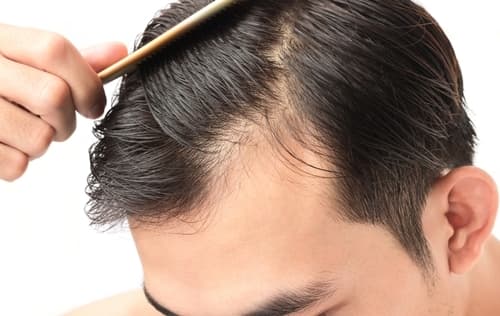The Relationship Between DHT & Hair Loss
As men get older, they tend to experience hair loss. Sometimes they attribute it to genetics or bodily functions slowing down as they get older.
As men get older, they tend to experience hair loss. Sometimes they attribute it to genetics or bodily functions slowing down as they get older.

As men get older, they tend to experience hair loss. Sometimes they attribute it to genetics or bodily functions slowing down as they get older. Genetics can play a role in male hair loss, but genetics don’t make up the entire story. For countless men, hair loss is caused by a common hormone known as dihydrotestosterone. It's found in both men and women, and it's a crucial part of human development. But too much or too little could lead to issues — most notably hair loss.
Dihydrotestosterone is a hormone that's made from testosterone. Both men and women have dihydrotestosterone in their bodies, though men carry it in larger quantities. This hormone is responsible for masculine sex characteristics like facial hair, increased muscle mass and a deeper voice. When men go through puberty, dihydrotestosterone is one of the driving forces behind the changes in their bodies. In adulthood, this hormone can help people remain fit and sexually active.
However, this hormone also has its drawbacks. If you have too much dihydrotestosterone in your body, you could suffer from prostate cancer or heart disease. More commonly, this hormone is responsible for the hair loss that plagues men as they get older. And if you don't have enough of this hormone, you might be more susceptible to tumors and other illnesses.
When people say that hair loss is genetic, they're not entirely wrong. Male pattern baldness is indeed passed through families, and if you don't have enough dihydrotestosterone in your system, the hair loss will be even more obvious. For some men, it seems that going bald is practically inevitable.
So how does this hormone cause your hair to fall out? The hair on your body grows from follicles that are tucked underneath the skin. If you have too much dihydrotestosterone in your system, the follicles will shrink, which makes your hair more brittle and prone to breakage. Additionally, high levels of this hormone can increase the amount of time that it takes your hair to grow back. In short, the high levels of this hormone make your hair grow more slowly, and when it grows, it's thin and brittle and falls out easily.
Typically, women have lower levels of dihydrotestosterone than men. However, there is still a link between DHT and hair loss in females. Women with high levels of dihydrotestosterone can develop thin, brittle hair that breaks and falls out easily. While they don't develop bald spots in the same way that men do, they might notice that the hair on their scalp is dry, thin and unhealthy.
Fortunately, there are multiple ways to treat hair loss related to high levels of DHT. Inhibitors are one of the most popular forms of dihydrotestosterone hair loss treatment. Like the name suggests, inhibitors can reduce the body's production of DHT, allowing hair to grow normally again. Ideally, the shrunk follicles will widen, allowing the hair to grow back thick and healthy instead of thin and brittle.
Blockers are another popular form of treatment. Instead of reducing the amount of DHT that your body produces, blockers prevent DHT from binding to the receptors that cause your follicles to shrink. As a result, your hair will start to grow back naturally. While blockers can give you a full head of hair again, they do come with side effects. Common side effects include erectile dysfunction, nausea, vomiting and even heart failure.
If you talk to your doctor, he or she might be able to prescribe medication to block or inhibit the DHT in your body. Finasteride is a popular prescription medication with a high success rate in men. However, there are certain vitamins and natural remedies you can try if you don't have time to swing by the doctor's office.
Pygeum bark and pumpkin seed oil are two natural remedies that have been known to reduce hair loss caused by DHT. You can also take biotin supplements or consume more foods that are high in biotin. Studies have shown that caffeine could also potentially reduce hair loss.
HAIRMD is based in Englewood NJ and proudly in Bergen County and across Northern New Jersey. Schedule a consultation with Dr. Herbert Feinberg and get personalized advice on your best hair restoration options.